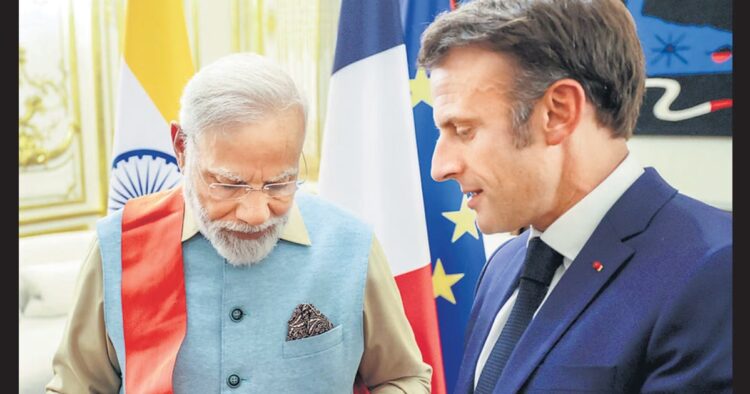In an effort to diversify its energy sources and reduce reliance on coal, Bharat is reportedly in talks with France to cooperate on the development of small modular nuclear reactors. The initiative is part of Prime Minister Narendra Modi’s broader plan to expand nuclear power usage in the country. The Department of Atomic Energy in India and Electricite de France (EDF) are expected to finalize a preliminary agreement during the visit of French President Emmanuel Macron to New Delhi this week, as per anonymous sources familiar with the matter.
The collaboration aims to harness small modular nuclear reactor technology, a relatively untested but promising field. These reactors are seen as more flexible and potentially lower-cost alternatives to traditional nuclear plants. While nuclear power contributed less than 3% to India’s electricity generation in 2022, the country, being the third-largest emitter of carbon dioxide globally, is looking to significantly increase its nuclear capacity over the next decade.
Multiple Offers on the Table
Apart from France, both Russia and the United States have expressed interest in jointly developing small modular reactors with Bharat. Discussions on this matter were reportedly held during talks between President Joe Biden and Prime Minister Modi last year. The competition for collaboration highlights the global interest in advancing nuclear technologies as part of efforts to combat climate change and meet growing energy demands.
The collaboration between Bharat and France is seen as a strategic move, with potential economic and environmental benefits for both nations. However, the finer details of the agreement are yet to be disclosed, as officials from Bharat’s atomic energy department, the Ministry of External Affairs, and representatives from EDF declined to comment on the ongoing negotiations.
Bharat’s Nuclear Energy Expansion Strategy
Bharat’s push for nuclear energy expansion aligns with its broader goals of decarbonization and meeting the increasing energy needs of its growing population. With the focus on small modular reactors, Bharat aims to introduce a more adaptable and cost-effective solution to its energy mix. The success of this collaboration could pave the way for a significant shift in Bharat’s energy landscape and contribute to global efforts in transitioning towards cleaner and more sustainable energy sources.
Challenges and Global Landscape
While the collaboration signals optimism for the small modular reactor technology, it’s important to note the challenges faced by the industry. The cancellation of plans by NuScale Power Corp. in the United States to build the first commercial power plant using small modular reactors in November 2022 underscored the uncertainties in the field. Nevertheless, with numerous companies worldwide actively working on advanced reactor designs, the global community remains invested in exploring innovative solutions for a cleaner and more efficient energy future.

















Comments